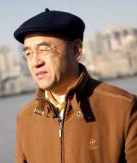By Staff
The Associated Press

Hu Zhicheng
LOS ANGELES (AP) — When he was finally able to leave China after being kept there for nearly five years over a dispute with a business rival, Chinese-American scientist Hu Zhicheng got out so fast that his wife didn’t have time to meet him at the airport.
Hu, an internationally known expert on catalytic converters, had gone to court several times over the years to try to get permission to leave the country and return to his Southern California home. His wife, Hong Li, meanwhile, had steadfastly lobbied U.S. officials for help.
When word that Hu had finally been released came June 3, however, it was not from any official from either government. It came from a relative in China who told Li he was on a plane headed for home. When she got to Los Angeles International Airport, he was nowhere to be found. He’d already gotten off the plane and gotten a cab.
“I got a call from my son, ‘Dad’s home! Dad’s home!’” Li said June 4, recounting the family reunion.
Her husband’s return ended a long, emotionally torturous separation that began when the naturalized U.S. citizen was arrested in his native country shortly before Thanksgiving 2008 and jailed for 17 months. A business rival had accused him of stealing trade secrets.
Cleared of wrongdoing by a police investigation, he was freed in 2010 and quickly headed to the airport, planning to return home. He was turned away, told that he had been placed under a border hold after his business rival sued him for damages in civil court.
For the next three years he would be free to travel anywhere in China, but not to leave the country.
He was finally allowed to go home just ahead of a summit between President Barack Obama and Chinese leader Xi Jinping, but Li told The Associated Press on June 4 she didn’t know if that played any part in her husband’s release.
“We have seen the press reports, and are pleased that Dr. Hu is home with his family,” was all the State Department said in a statement.
A spokesman at the U.S. Embassy in China had no immediate comment, and Li herself was reluctant to say too much during a phone interview on June 4.
“He came home last night. Thank you for all your help!!!!!,” she had simply stated in an email to the AP announcing his return.
She didn’t know if the civil suit had been resolved, she said during the later phone interview. She added that her husband wasn’t ready to discuss his ordeal or his return.
“We need time together,” she said of the family. “We haven’t had time to recover physically and emotionally yet.”
Asked if she thought her husband might ever return to China again, she did manage to laugh.
“No, I don’t think so. I doubt it,” she said.
Until June 3, Hu’s high school-aged son, Richard, hadn’t seen his father since he was 13. His college-age daughter, Victoria, was 16 when he was arrested, although she managed to visit him briefly in China in 2010 after he was released from jail.
An international authority on the development of catalytic converters used to limit pollution in automobiles, Hu holds a doctorate in engineering and more than 50 patents. He has performed research at the Massachusetts Institute of Technology and worked for international companies.
He returned to China in 2004 after years in the U.S., hoping to get in on the ground floor building cleaner-running automobiles just as smog-choked China’s economy was booming.
Hu became chief scientist and president of a company trying to build top-grade catalytic converters and was honored by the province of Jiangsu as one of its leading innovators. Li, meanwhile started her own business in China supplying materials to the company that employed her husband. She also holds a doctorate in engineering.
After his competitor accused him of stealing trade secrets, Hu became worried enough that he told his wife and children not to return from a summer visit to the U.S. in 2008. Shortly before Thanksgiving that year, he was arrested.
Li and Hu, both born in China, had become U.S. citizens several years ago and both their children were born in the U.S.
After visiting her father in China upon his release from jail, Hu’s daughter launched a relentless campaign from the United States seeking his release.
She posted a petition to Change.org that collected more than 60,000 signatures and started a Facebook page called “Help Victoria’s Father Dr. Zhicheng Hu Come Home.” With the help of a friend, she published a graphic novel online reporting her father’s situation.
Her mother, meanwhile, contacted the State Department and other officials for years.
All of those efforts had seemed to lead nowhere until June 3. (end)
Associated Press writer Charles Hutzler in Beijing contributed to this report.



